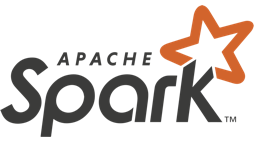Structured Streaming + Kafka Integration Guide (Kafka broker version 0.10.0 or higher)
Structured Streaming integration for Kafka 0.10 to poll data from Kafka.
Linking
For Scala/Java applications using SBT/Maven project definitions, link your application with the following artifact:
groupId = org.apache.spark
artifactId = spark-sql-kafka-0-10_2.11
version = 2.1.0
For Python applications, you need to add this above library and its dependencies when deploying your application. See the Deploying subsection below.
Creating a Kafka Source Stream
// Subscribe to 1 topic
val ds1 = spark
.readStream
.format("kafka")
.option("kafka.bootstrap.servers", "host1:port1,host2:port2")
.option("subscribe", "topic1")
.load()
ds1.selectExpr("CAST(key AS STRING)", "CAST(value AS STRING)")
.as[(String, String)]
// Subscribe to multiple topics
val ds2 = spark
.readStream
.format("kafka")
.option("kafka.bootstrap.servers", "host1:port1,host2:port2")
.option("subscribe", "topic1,topic2")
.load()
ds2.selectExpr("CAST(key AS STRING)", "CAST(value AS STRING)")
.as[(String, String)]
// Subscribe to a pattern
val ds3 = spark
.readStream
.format("kafka")
.option("kafka.bootstrap.servers", "host1:port1,host2:port2")
.option("subscribePattern", "topic.*")
.load()
ds3.selectExpr("CAST(key AS STRING)", "CAST(value AS STRING)")
.as[(String, String)]// Subscribe to 1 topic
Dataset<Row> ds1 = spark
.readStream()
.format("kafka")
.option("kafka.bootstrap.servers", "host1:port1,host2:port2")
.option("subscribe", "topic1")
.load()
ds1.selectExpr("CAST(key AS STRING)", "CAST(value AS STRING)")
// Subscribe to multiple topics
Dataset<Row> ds2 = spark
.readStream()
.format("kafka")
.option("kafka.bootstrap.servers", "host1:port1,host2:port2")
.option("subscribe", "topic1,topic2")
.load()
ds2.selectExpr("CAST(key AS STRING)", "CAST(value AS STRING)")
// Subscribe to a pattern
Dataset<Row> ds3 = spark
.readStream()
.format("kafka")
.option("kafka.bootstrap.servers", "host1:port1,host2:port2")
.option("subscribePattern", "topic.*")
.load()
ds3.selectExpr("CAST(key AS STRING)", "CAST(value AS STRING)")# Subscribe to 1 topic
ds1 = spark
.readStream()
.format("kafka")
.option("kafka.bootstrap.servers", "host1:port1,host2:port2")
.option("subscribe", "topic1")
.load()
ds1.selectExpr("CAST(key AS STRING)", "CAST(value AS STRING)")
# Subscribe to multiple topics
ds2 = spark
.readStream
.format("kafka")
.option("kafka.bootstrap.servers", "host1:port1,host2:port2")
.option("subscribe", "topic1,topic2")
.load()
ds2.selectExpr("CAST(key AS STRING)", "CAST(value AS STRING)")
# Subscribe to a pattern
ds3 = spark
.readStream()
.format("kafka")
.option("kafka.bootstrap.servers", "host1:port1,host2:port2")
.option("subscribePattern", "topic.*")
.load()
ds3.selectExpr("CAST(key AS STRING)", "CAST(value AS STRING)")Each row in the source has the following schema: <table class="table">
</table>
The following options must be set for the Kafka source.
| Option | value | meaning |
|---|---|---|
| assign | json string {"topicA":[0,1],"topicB":[2,4]} | Specific TopicPartitions to consume. Only one of "assign", "subscribe" or "subscribePattern" options can be specified for Kafka source. |
| subscribe | A comma-separated list of topics | The topic list to subscribe. Only one of "assign", "subscribe" or "subscribePattern" options can be specified for Kafka source. |
| subscribePattern | Java regex string | The pattern used to subscribe to topic(s). Only one of "assign, "subscribe" or "subscribePattern" options can be specified for Kafka source. |
| kafka.bootstrap.servers | A comma-separated list of host:port | The Kafka "bootstrap.servers" configuration. |
The following configurations are optional:
| Option | value | default | meaning |
|---|---|---|---|
| startingOffsets | earliest, latest, or json string {"topicA":{"0":23,"1":-1},"topicB":{"0":-2}} | latest | The start point when a query is started, either "earliest" which is from the earliest offsets, "latest" which is just from the latest offsets, or a json string specifying a starting offset for each TopicPartition. In the json, -2 as an offset can be used to refer to earliest, -1 to latest. Note: This only applies when a new Streaming query is started, and that resuming will always pick up from where the query left off. Newly discovered partitions during a query will start at earliest. |
| failOnDataLoss | true or false | true | Whether to fail the query when it's possible that data is lost (e.g., topics are deleted, or offsets are out of range). This may be a false alarm. You can disable it when it doesn't work as you expected. |
| kafkaConsumer.pollTimeoutMs | long | 512 | The timeout in milliseconds to poll data from Kafka in executors. |
| fetchOffset.numRetries | int | 3 | Number of times to retry before giving up fatch Kafka latest offsets. |
| fetchOffset.retryIntervalMs | long | 10 | milliseconds to wait before retrying to fetch Kafka offsets |
| maxOffsetsPerTrigger | long | none | Rate limit on maximum number of offsets processed per trigger interval. The specified total number of offsets will be proportionally split across topicPartitions of different volume. |
Kafka’s own configurations can be set via DataStreamReader.option with kafka. prefix, e.g,
stream.option("kafka.bootstrap.servers", "host:port"). For possible kafkaParams, see
Kafka consumer config docs.
Note that the following Kafka params cannot be set and the Kafka source will throw an exception:
- group.id: Kafka source will create a unique group id for each query automatically.
- auto.offset.reset: Set the source option
startingOffsetsto specify where to start instead. Structured Streaming manages which offsets are consumed internally, rather than rely on the kafka Consumer to do it. This will ensure that no data is missed when when new topics/partitions are dynamically subscribed. Note thatstartingOffsetsonly applies when a new Streaming query is started, and that resuming will always pick up from where the query left off. - key.deserializer: Keys are always deserialized as byte arrays with ByteArrayDeserializer. Use DataFrame operations to explicitly deserialize the keys.
- value.deserializer: Values are always deserialized as byte arrays with ByteArrayDeserializer. Use DataFrame operations to explicitly deserialize the values.
- enable.auto.commit: Kafka source doesn’t commit any offset.
- interceptor.classes: Kafka source always read keys and values as byte arrays. It’s not safe to use ConsumerInterceptor as it may break the query.
Deploying
As with any Spark applications, spark-submit is used to launch your application. spark-sql-kafka-0-10_2.11
and its dependencies can be directly added to spark-submit using --packages, such as,
./bin/spark-submit --packages org.apache.spark:spark-sql-kafka-0-10_2.11:2.1.0 ...
See Application Submission Guide for more details about submitting applications with external dependencies.
